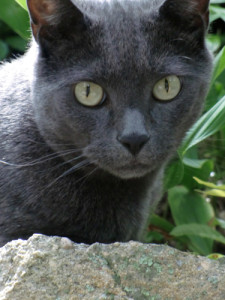by Paul Gorrell on 07/18/12
As it appeared on Huffington Post
Last winter, I was discussing a coaching client’s challenge in communicating empathy with colleagues. He told me that there are times that his co-workers are too focused on personal matters that are not that interesting or important to him. The example he used to prove his point was with people who are emotional after their pet dies. He was really dismissive in his tone about the traumatic loss that a pet lover experiences. My response was to personalize the situation by telling him that I will be an absolute mess if anything ever happens to one of my cats.Three weeks later, I was away from home on a business trip when my partner told me on Skype that our 15-year-old cat, Virgil, had become very sick. Eventually we would come to understand that he had congestive heart failure. The vet let us know that he had “days, not months” to live and our intense mourning process began. We thought Virgil would not be with us for long.
Soon after, it was time to see my coaching client for another session. I was faced with the dilemma: Do I speak with him about my situation or do I keep quiet about it, not wanting to suffer from the indifference that he might show? Also, I wouldn’t want to embarrass him since I clearly knew his stand on this situation and, by bringing it up, I could make him feel guilty. It would be inappropriate to do that in terms of my role as an executive coach.
On the other hand, by bringing Virgil’s illness up, there was a chance that this situation could spark the empathy that my client was seeking to develop. The dilemma I experienced about telling my client that I had a sick and soon to be deceased pet is faced by people in all kinds of jobs, all the time. It is a challenging circumstance because you are never really sure of how people will react to the rawness of the emotion. Some will be supportive, having the same bond with a pet of their own or a complete understanding of the traumatic sense of this loss. Others will not get it and seem almost dumbfounded that you would raise the topic. This latter experience can feel humiliating at some level. It’s as if you should feel guilty about feeling so deeply for your pet.
But I am a firm believer that you be authentic at work. For instance, I facilitate a program on Authentic Leadership claiming that leaders need to own the purpose behind their actions and communicate this purpose to others. Being authentic means being clear in your communication about the passion that is behind the choices you make. And sometimes your passion is not related to a project or a business goal. Sometimes, it’s the passion that drives your life and your love. How could I not speak of my concern for Virgil in appropriate circumstances? People with whom I interact would clearly see that I might not be myself, why wouldn’t I tell them the reason behind my disposition? To not do so, is to have them “fill in” the reason for me.
Some people simply have more difficulty understanding the bond that a person can have with their pet. For 15 years, Virgil was an ever present part of our household. He didn’t simply show tremendous affection for us, he always wanted to know what we were doing and be part of the scene. This curious quality would make him a happy spectator when you were cooking or a friendly visitor as you sat at your computer. Virgil wanted to be with us all the time and that brought us great pleasure. The idea of him not being there, the permanence that only death can bring, creates a durable sense of loss and a painful gap that sweet memories can only partially satisfy.
What became interesting about the period after Virgil’s diagnosis was that I got to explore the dilemma of “coming out” as a grieving pet lover many times. This was due to the fact that Virgil was a bit of a miracle man. He responded well to some of the medicines and the nursing that we provided. He was supposed to live days but ended up living a bit over four months. For this extended time, I let my clients know about the struggle and opened up about the pain. With some, where I had an enduring relationship, I was able to discuss it more freely. With others, I was respectful of the newness or more superficial quality of our relationship, and avoided going too deeply into the issue. But, no matter what, I tried to be authentic at all times.
That includes with my coaching client who previously expressed a lack of empathy for pet lovers in bereavement. I made the decision to bring up my situation in that session that followed Virgil’s diagnosis. My client immediately wanted to demonstrate concern, perhaps there was some guilt there, or perhaps it was a need to please a coach who was becoming more important in his life. But the sympathy was there and it was real. The experience of sympathy can lead to the development of empathy. Interestingly, the bond around my impending loss became somewhat of a foundation for our work together. It was built on trust going forward. He had shared a darker side of himself. I shared information that made me feel vulnerable. I believe our work together was better off from confronting the topic openly and authentically.
My suggestion is that pet lovers will experience far more benefits from communicating their loss than they will by bottling it up. Not only will some understanding come our way, but our disposition will be absolutely understandable to others because we have shared the underlining reason. Our colleagues will not fill in some message about why we are the way we are during the mourning process. They will know the “why” behind how we are and have the opportunity to be compassionate. We can even help them to be better people through our loss.
My cat Virgil, pictured above, died on July 13, 2012. I wrote this blog on July 14, 2012.

